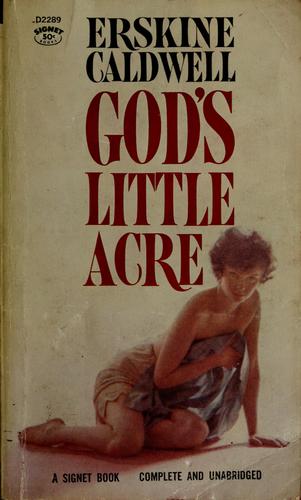Book Review: God’s Little Acre by Erskine Caldwell
Ty Ty Walden likes to think of himself as a good Christian. That’s why he has tithed the proceeds of an acre on his Georgia farm to the church. But he’s also got gold fever. Ty Ty is convinced that somewhere on his land is a rich vein of gold just waiting to be dug up. For the last fifteen years, he and his family have been digging holes. And it would be a real shame if all that gold went to make the church rich, so each time Ty Ty starts a new hole, he relocates God’s Little Acre as far away as possible.

Ty Ty Walden has five children. The eldest, Jim Leslie, realized early on that all this talk of gold was nonsense. He went up to Augusta, married into money, and refuses contact with the rest of the family. Buck found an extraordinarily attractive bride (somehow, somewhere), Griselda, and brought her back to the farm. Rosamond married a South Carolina mill worker named Will Thompson and lives with him in Scottsville. Shaw is a quiet man who likes the ladies and hasn’t settled on one yet, and “Darling” Jill is crazy about men.
Because Ty Ty, Buck and Shaw spend all their time digging for gold, the actual farm work is done by two sharecroppers, Black Sam and Uncle Felix. The land under cultivation grows smaller every year as more of it is dug up for gold pits.
The plot kicks off when Pluto Swint, a fellow with a prominent belly and a distinct lack of work ethic, visits the Waldens. He’s running for sheriff, thinking that he can sit back and have the deputies do the hard work while he rakes in that sweet county salary. Pluto’s out looking for votes, so he says, but not moving very fast about it. He’s also infatuated with Darling Jill, and wants to marry her, but she’s not nearly ready to settle down yet. (She’s perfectly willing to exploit him for rides in his motorcar though.)
Pluto mentions that an albino has been spotted down in the swamp, and as any fool knows, an “all-white man” can dowse for gold. It’s scientific. Ty Ty decides that he and his sons will abduct this stranger to help them locate the gold, and sends Darling Jill with Pluto to fetch Rosamund and Will Thompson to help with the digging.
As it happens, Will Thompson has some spare time right now, as Scottsville is in the eighteenth month of a factory lockout. The company town cotton mill owners wanted to lower the wages of their workers to $1.10 a day (about $22 in 2021 money), the workers quite understandably objected, and the owners shut down the factory and locked the gates in an attempt to starve their employees into submission. There’s been some talk of breaking into the mill to start the power up and having the workers take control of the means of production, but just talk so far.
Between abject poverty and the Walden clan’s inability to keep it in their pants, tragedy is about to ensue.
This 1933 novel of the South was declared “not pornography” in a New York court (the judge’s decision is appended in the edition I read), but I can see where some confusion might have arisen on that point. The characters think about and talk about sex a lot, and sometimes actually do it in ways that even current American society would find skeevy. The language is often vulgar and earthy.
None of the characters are particularly likable, but they’re certainly memorable. Ty Ty slips easily between homespun wisdom for others and absolute foolishness for himself and his family. He’s a farmer in the South during the Depression, so he would still be poor in any case, but his situation is just made so much worse by his obsession with striking it rich with gold. He’s indulgent of his children’s worst habits, which leads ever closer to the destruction of the family.
Will Thompson is obsessed with going back to work at a job that leaves the workers bloody-lipped and coughing their lungs out from cotton microfibers. He isn’t even asking for better safety standards or medical benefits, just for a wage that he can live on. But the mill owners can’t budge on even that. Thanks, capitalism!
Pluto Swint is the sort of fellow to announce that he’s needing to get on the road real soon now, and still be sitting on the porch three hours later. We never hear about his sheriff campaign from anyone but him and the Waldens, so it seems unlikely he’ll get elected.
There are some scenes where we’re looking from the viewpoint of the women, or the black sharecroppers, and it’s painfully obvious this was written by a white dude.
Dave Dawson, the albino man, just kind of vanishes from the story about midway through, lampshaded at the end when Ty Ty realizes he hasn’t seen his captive in days and has no idea whether that person is even still on the farm. But the tragedy and Ty Ty’s attempts to make it mean something take precedent.
Content note: Extramarital sex, dubious consent, racism (primarily outdated language), sexism, ableism(?) towards albinos, fat-shaming, slut-shaming, Ty Ty cannot shut up about Griselda’s “rising beauties” which gets really creepy.
Overall: Well, that was certainly a book that I have now read. For all my quibbles, there are some powerful passages and good use of repeated similes, and the book is never dull. This novel was a huge hit back in the day, and a strong influence on Southern literature. Because of the subject matter, I recommend this volume for mature readers only.
There was also a movie, which de-emphasized the sex a bit (Hays Code being in effect) and focused more on the “capitalism bad” part. Here’s the trailer!

